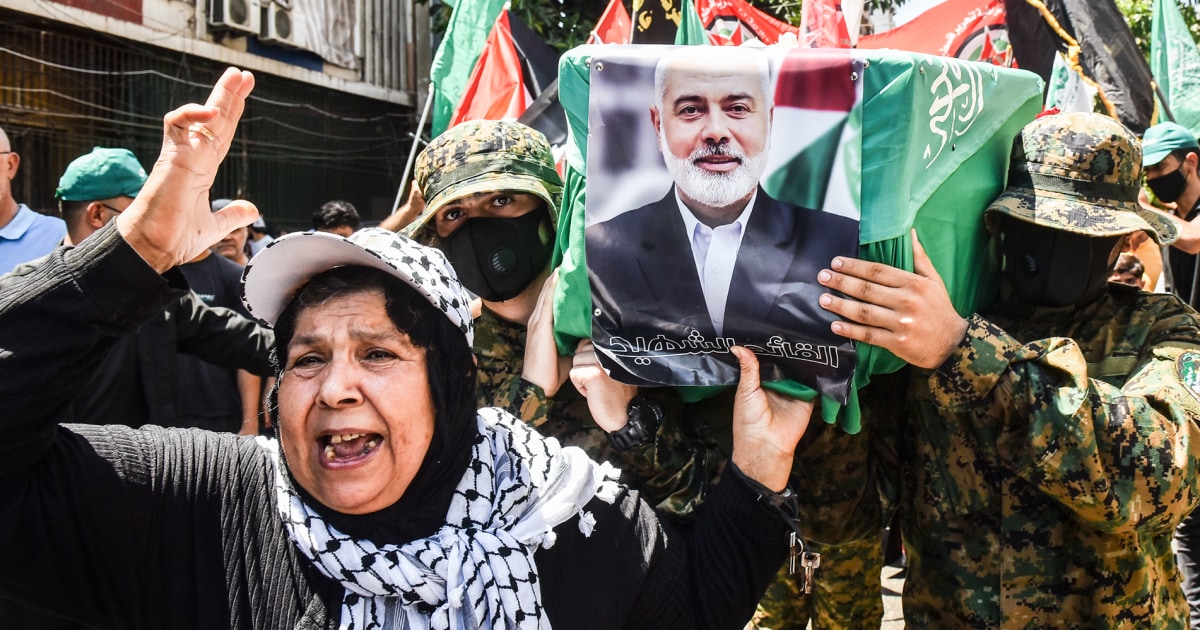TEL AVIV — Israel is bracing for a potential multiday attack by Iran and its ally Hezbollah following the assassination of two senior militant leaders last week, an Israeli official told NBC News.
The official said Israel fears waves of missiles and drones could be fired over several days in response to the killing of Hamas political leader Ismail Haniyeh and Hezbollah commander Fuad Shukr.
“They’ll just try to wear us out,” the official said.
This tension marks yet another escalation in the Middle East during the 10 months of the Israel-Hamas war, characterized by a series of heightened stress points amid worries that an all-out regional conflict is on the horizon.
Israel killed Shukr in a strike on the southern suburbs of Beirut last Tuesday. The strike in the largely Shia neighborhood also killed three civilians, including two children, and injured 74 others, according to the Lebanese health ministry.
Israel’s military blamed Shukr for an attack in the Israeli-controlled Golan Heights that killed 12 children, saying there was no price too high for the “blood of our people.” Hezbollah denied responsibility for that attack.
Hours later, news broke that Haniyeh was killed in Tehran in the early hours Wednesday morning. Haniyeh was in Iran to attend the inauguration of the new Iranian President Masoud Pezeshkian.
President Joe Biden spoke to Prime Minister Benjamin Netanyahu the day after Haniyeh’s assassination. The president has said publicly that the killing was not helpful to U.S. efforts to reach a cease-fire in Gaza. The call was “tense,” according to the Israeli official.
“There is strong U.S. pressure to reach a cease-fire,” the official said. “Biden wants it to happen during his time in office.”
Israeli negotiators were in Cairo on Saturday for continuing negotiations but left without a breakthrough, the official said.
Iranian officials have vowed to retaliate against Israel, though the country has not publicly taken responsibility for Haniyeh’s assassination. Hezbollah’s leader also told his followers that Israel would hurt for the attacks.
When Iran attacked Israel on April 13 — in response to the bombing of its embassy in Damascus — it fired 300 ballistic missiles, cruise missiles and drones in tight volleys so the different projectiles would reach Israel simultaneously. The vast majority were intercepted by Israeli and U.S. forces, while Hezbollah largely stayed out of the fight.
This time, the Israeli official said the attacks could come over several days, with Hezbollah attacking Israel from the north while Iran’s longer-range weapons are fired from the east.
It would mark the second time that Iran has made a direct attack on Israel this year, a rare head-on assault for a regime often believed to be acting through its proxies in the region.
Diplomats have been working to avoid a larger regional war in the Middle East since the Oct. 7 Hamas terror attack in which 1,200 were killed and some 250 kidnapped. But those efforts have not stopped Hezbollah and the Houthis, two Iran-backed militias, from escalating attacks on Israel in what its groups describe as support for the Palestinian cause.
Meanwhile the death toll in Gaza continues to climb, with the latest estimates from officials in the enclave nearing 40,000 dead.
Family members of hostages who remain in Gaza have pleaded with Netanyahu to secure a deal that would see their loved ones brought home. Some of the hostage family members were detained last month for protesting during the prime minister’s address to Congress during a visit to the U.S.
Raf Sanchez reported from Tel Aviv. Doha Madani report from New York City.

